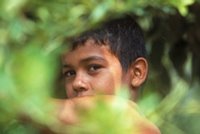He closed his hand gently around a cluster of glowing motes, knowing they couldn't be captured and taken out of their beam of light. He wondered if they passed through the flesh of his hand to escape or simply flowed around his fingers. He opened his hand, his fingers together, and instantly a whole colony of sparkles was snuffed out in a column of shadow within the sunbeam. He turned his hand sideways, and a new generation only lived a moment, as some larger shadow outside swept them into nothingness. [From Daniel Quinn's novel The Holy.]Last night we went to hear a panel discuss the effects of the conflict in Colombia on public health. The speakers included the head of Medicos Sin Fronteras (Doctors Without Borders), a Alfredo Molino (well known journalist and author of book The Dispossessed: chronicles of the desterrados of Colombia, dismissed by an acquaintance as "just a bunch of stories"), the president of group of displaced communities, and a Jesus Abad, a Colombian photojournalist.
He was the only, journalist willing to travel with members of the peace community San Jose de Apartado to the scene of the massacre last year. Didn't look like he'd be much for public speaking, but he started out, after a dramatic pause: "Yesterday I became ill. I was infected by a fear of the public -- I never know who I will encounter at these engagements." He spoke like a man at his own wake. Yet the candles he lit with his words and photos would not be snuffed out - it was quite simply the most chilling yet invigorating talk I've ever heard.
[Translated from his comments:]
This is a country of fear, where many journalists cover our mouths, cover our eyes. We cultivate mediocrity.
[What his friends say to keep him from speaking out against the complicity of the state] "Memory is more important than one day's scandal."
[His response] The press is complicit with this complicity - of the public forces with the paramilitaries.
In one way or another, everyone in this country ends up with a family member in one or another of the armed actors.
Killing the people is not revolution.
Do not allow the truth to be camouflaged.
 His work is technically great, soulful, thematically important, sometimes more than one can stand to look at, and absolutely worth seeing. When images of a child's drawings appeared on the screen in front of us -- drawings of a man kneeling in front of a tree, gun held to his head, while bodies floated, a country's debris, down the river -- the room gasped. Did we breathe again?
His work is technically great, soulful, thematically important, sometimes more than one can stand to look at, and absolutely worth seeing. When images of a child's drawings appeared on the screen in front of us -- drawings of a man kneeling in front of a tree, gun held to his head, while bodies floated, a country's debris, down the river -- the room gasped. Did we breathe again?Along these lines, Josh sent an article from Human Rights Watch Colombia: Uribe Must End Attacks on Media.
Colombia and the U.S. share more than a drug problem, it would seem.

No comments:
Post a Comment